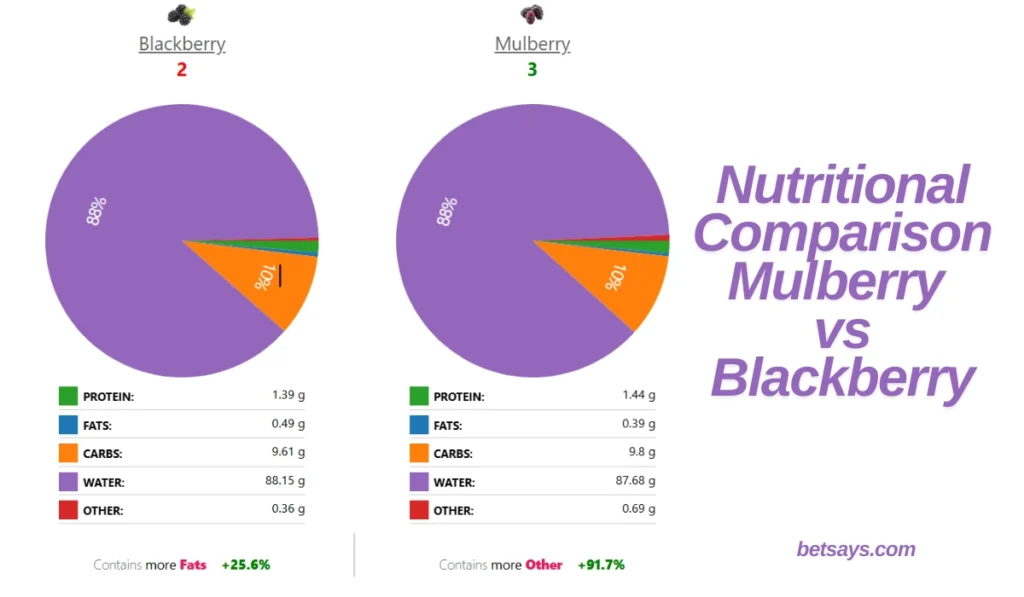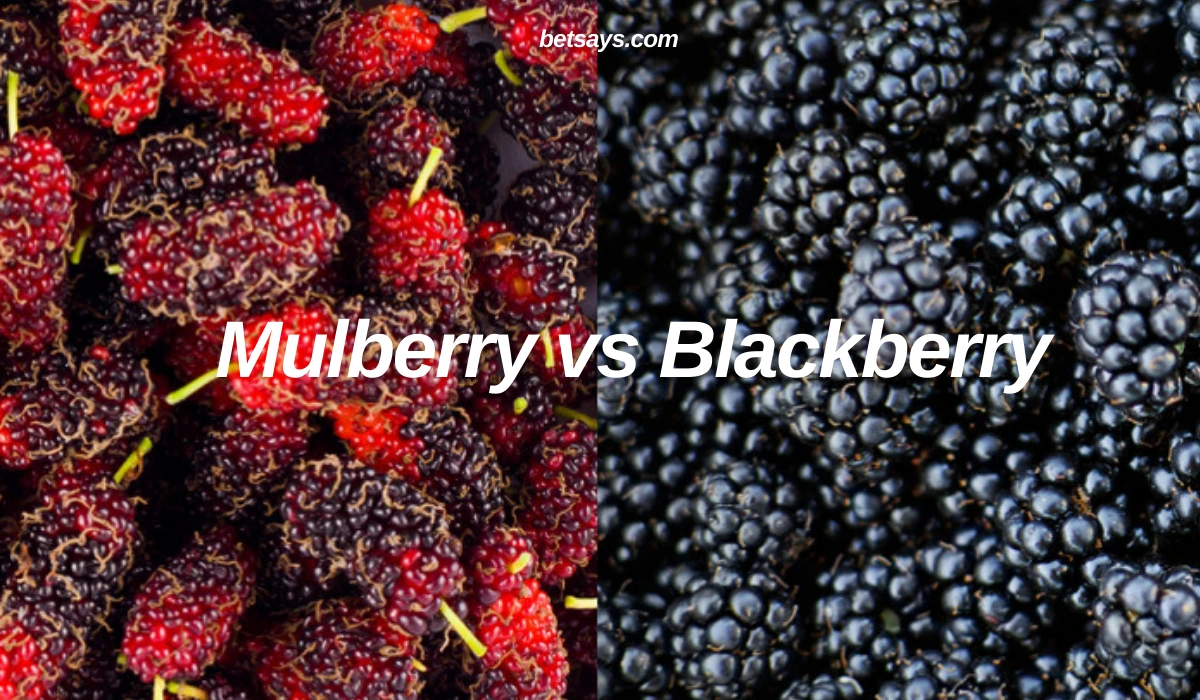Mulberry vs Blackberry: Comparison of Two Delicious Berries
Mulberries and blackberries are two popular berries that often confuse people due to their similar appearance. However, they come from different botanical families, grow in different environments, and offer distinct flavors, nutritional benefits, and culinary uses. Whether you’re curious about their health advantages or wondering how to use them in the kitchen, this detailed comparison of Mulberry vs Blackberry will help you understand their unique qualities.
Origins and Plant Differences: Mulberry vs Blackberry
Mulberries grow on deciduous trees that belong to the Moraceae family. These trees are medium to large, with wide-spreading branches, and are typically found in temperate climates. There are three main species of mulberry: Morus alba (white mulberry), Morus nigra (black mulberry), and Morus rubra (red mulberry). Mulberry trees are native to Asia, Africa, and North America, and they thrive in both cultivated and wild settings.
In contrast, blackberries belong to the Rosaceae family, which also includes raspberries and strawberries. Blackberries grow on thorny bushes or brambles, forming a dense shrub. These plants are native to Europe, North America, and Asia, and they are known for producing juicy, sweet-tart fruits. While mulberries are individual fruits developing from a single flower, blackberries are aggregate fruits, made up of smaller drupelets clustered together.
Taste and Culinary Applications
When comparing mulberry vs blackberry, one of the key differences lies in their flavor and texture. Mulberries tend to be sweeter, with a mild tartness that becomes more pronounced if they are picked before ripening. They are enjoyed both fresh and dried. Mulberries are also versatile in the kitchen, used to make jams, juices, syrups, and baked goods. Dried mulberries are particularly popular in snacks and trail mixes, adding a chewy texture and natural sweetness.
Blackberries, on the other hand, are known for their bold, sweet-tart flavor. Their taste varies slightly depending on the variety and ripeness, but they generally carry more tang than mulberries. Blackberries are perfect for baking in pies, cobblers, and tarts, and they also work well in sauces and smoothies. Due to their high pectin content, blackberries are ideal for making jam without needing additional thickening agents.
Read more: Best Exercises to Improve your eyesight
| Aspect | Mulberry | Blackberry |
|---|---|---|
| Growth | Grows on trees (Morus genus) | Grows on brambles (Rubus genus) |
| Flavor | Sweet with mild tartness | Sweet-tart, bold taste |
| Uses | Eaten fresh, dried, in jams, and juices | Used in baking, jams, sauces, and smoothies |
| Availability | Harder to find in stores | Widely available in grocery stores |
Nutritional Comparison: Mulberry vs Blackberry

Both mulberries and blackberries are rich in essential nutrients and offer numerous health benefits. However, there are some differences in their nutritional profiles. Mulberries are packed with vitamin C, iron, potassium, and fiber. They also contain a powerful antioxidant called resveratrol, which is known for its anti-inflammatory and heart-protective properties. The high iron content in mulberries makes them particularly beneficial for people with anemia or iron deficiencies.
Blackberries, meanwhile, are high in vitamin C, vitamin K, folate, and manganese. They are loaded with anthocyanins and ellagic acid, antioxidants that may help reduce the risk of chronic diseases, including cancer. Like mulberries, blackberries are also high in fiber, promoting healthy digestion and supporting heart health.
| Nutrient | Mulberry | Blackberry |
|---|---|---|
| Vitamin C | High | High |
| Iron | High | Moderate |
| Fiber | High | High |
| Antioxidants | Resveratrol, anthocyanins | Anthocyanins, ellagic acid |
Culinary Uses: Mulberry vs Blackberry
Both fruits are versatile and can be used in a variety of dishes, though they differ slightly in how they are typically consumed.
- Mulberries: Often eaten fresh, dried, or used in smoothies, jams, and teas. Their sweetness makes them ideal for desserts and fruit salads.
- Blackberries: Commonly used in pies, tarts, and jams due to their tangy flavor. They also complement savory dishes, such as sauces for meats.
Since mulberries are softer, they tend to perish quickly and require careful handling, whereas blackberries are firmer and store better.
Growth and Availability
Another key point in the mulberry vs blackberry debate is their growth pattern and availability. Mulberry trees take several years to mature, with fruit production often starting after 2 to 8 years. These trees are prized not only for their fruit but also for their ornamental value and ability to provide shade.
Blackberries, however, grow on perennial bushes that bear fruit much sooner, typically in their second year. This makes blackberry cultivation easier and more predictable. As a result, blackberries are widely available in stores, while mulberries are harder to find due to their fragile nature and short shelf life. Mulberries are often foraged directly from trees, as they are not commonly sold in markets.
Read more: James gandolfini net worth
Frequently Asked Questions
Are mulberries and blackberries the same?
No, mulberries and blackberries are different fruits from separate botanical families. Mulberries grow on trees, while blackberries grow on bushes.
Which is healthier, mulberry or blackberry?
Both berries offer excellent health benefits. Mulberries are rich in iron and resveratrol, while blackberries provide more antioxidants like anthocyanins and ellagic acid.
Can mulberries be eaten raw?
Yes, mulberries can be eaten raw. They are sweet and juicy, but they can also be used in dried form or added to various recipes.
Why are mulberries hard to find in stores?
Mulberries are delicate and have a short shelf life, making them difficult to transport and store, which is why they are less available in grocery stores.
Conclusion
In conclusion, both mulberries and blackberries are delicious, nutrient-rich fruits with their own unique qualities. Mulberries offer a sweeter taste and are known for their high iron content and resveratrol, which supports heart health. Blackberries, with their more robust tartness, are widely used in baking and jam-making due to their high pectin content and antioxidant profile.
The choice between mulberry vs blackberry ultimately comes down to personal preference and availability. If you enjoy a softer, sweeter fruit with historical significance, mulberries might be your choice. However, if you prefer a bold, tangy flavor and easier access, blackberries are more practical. Either way, both berries offer numerous health benefits, making them a valuable addition to your diet.







